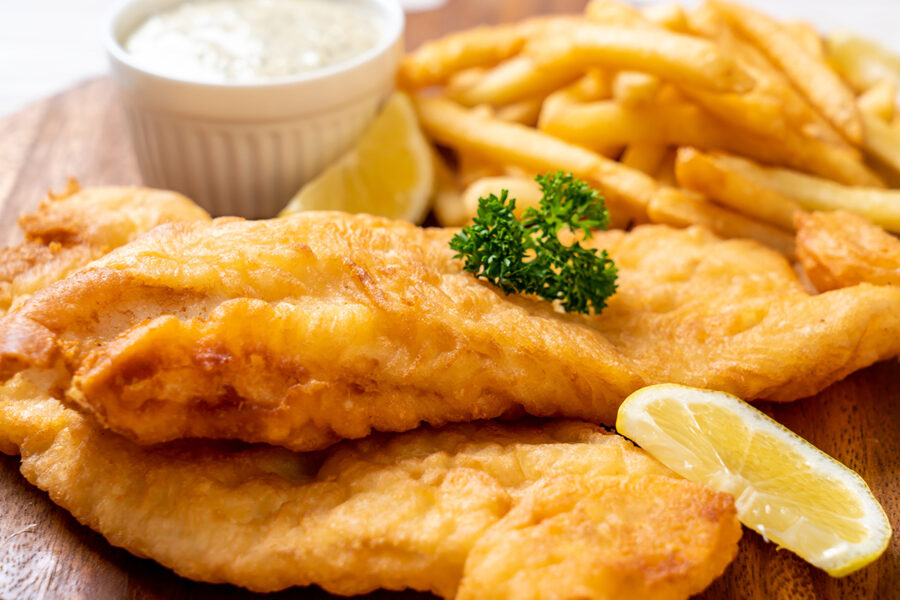The cost of a fish supper has risen more than any other popular takeaway mean, according to figures from the Office for National Statistics.
The average price of takeaway fish and chips was £9.88 in July this year, up from £6.98 in July 2019 – a rise of 52%.
Comparative increases for other popular takeaways over the same period are 44% for a kebab, 30% for a pizza and 29% for an Indian or Chinese meal.
Chip shops blame the soaring price on rising energy bills, tariffs on seafood imports, high labour costs, inflation and poor weather hitting potato harvests. Many report that customers are switching to cheaper – and less nutritious – choices, such as sausage and chips, with the potential for a long-term downturn in demand for fish.
“I’ve never known such an onslaught of pressures in terms of costs going up,” Jon Long of Long John’s Fish and Chips in Dorset told the BBC.
“We’ve had the perfect storm of events in terms of cost pressures. It’s not a cheap meal any more – I think it’s still good value, but it has become more expensive.”
A high proportion of fish used in chip shops comes from Russia, and in March 2022 the UK government imposed a 35% tariff on Rissian seafood imports in response to the invasion of Ukraine.
More recently, extreme weather conditions have hit potato harvests, with a small crop last year across the whole of Europe. Latest figures from Defra’s Agricultural Price Index show steep rises in the cost of potatoes in the last two years.
Jon Long said the current economic climate was the ‘toughest set of conditions’ he had faced in his 30-plus years in the business. “More and more pubs, hotels, chip shops, bakers and other businesses are shutting down due to crippling costs,” he said.
Jimmy Buchan, chief executive of the Scottish Seafood Association, who also runs the seafood business Amity Fish, said the high cost of a fish supper was an indication of ‘the stark reality’ of the rising cost of living, with tariffs on Russian fish adding to the price increases.
“A lot of people have switched off Russian-sourced fish, which is subject to tariff and was the world’s biggest supplier,” he told Fishing News.
“It’s a supply and demand industry, and if you switch off your biggest source of seafood that means the pressure goes on the remaining fisheries, which means more people are chasing those sources and the market responds to that – so access to raw material becomes more costly.
“That’s one thing, plus we see how inflation has impacted the UK over the last two years. Wages had to go up, and to get people to work in foodservice, wages have had to increase beyond the average because we’re struggling to get people to work in the industry.”
But he said fish was part of healthy eating, and despite its cost people should continue to eat locally caught fish wherever they could, and try to eat two portions a week.
“I would like to see government promoting that. I know everyone can’t afford a fish supper at £10, it’s becoming a luxury, but there are other sources of fish that are cheaper.
“In Scotland there is an abundance of smaller-sized haddock that would make great fish and chips. We’ve got this vision that we want a whale on our plate for a fish supper, but we have to realise there’s a great source of quality Scottish fish in the seas waiting to be harvested.”
‘We need to promote seafood in the UK’
Jimmy Buchan was critical of Seafish’s 2022 decision to discontinue its Love Seafood campaign – launched just 18 months earlier as an ‘ambitious long-term consumer marketing initiative’ – although he accepted that a majority of processors had called for it to stop because it did not provide value for money.
“I continue to criticise the Seafish board for taking that decision,” he said. “The UK is an island nation of 70m people, and we do not promote our fish. I know it was done due to costs – but at what cost to the industry, the fishermen, the fishing communities?
“It’s scandalous that we do not promote seafood in our own country. The board has taken a decision they will do it internationally and go into international arenas, and yet our home market has been neglected. They promote fish abroad, but they have stopped all promotion of seafood in the UK.
“The processing industry pays towards the Seafish levy, and while the international arena is good for some processors, not all of them are in the international arena, but they have to pay the levy.
“The processors said they didn’t feel the Seafish promotion of seafood was value for money, and they would rather it was stopped. On the back of that they pulled all UK promotions – but were the promotions the right promotions?”
He said producers of other protein foods such as lamb, beef and chicken continued to promote their products. “What about all the herring and mackerel we land, what about the shellfish, all the whitefish we land? For decades now, the younger generation coming up don’t realise we have got this great resource on our doorstep.
“And therefore, it ends up that 80% of the fish we land we export, and 80% of what we eat we import.
“We’re an island nation, famous for fish, especially in Scotland, but we have no national UK body promoting it. In Scotland, we’ve got Seafood Scotland, but that depends on Scottish government funding.”
This story was taken from the latest issue of Fishing News. For more up-to-date and in-depth reports on the UK and Irish commercial fishing sector, subscribe to Fishing News here or buy the latest single issue for just £3.30 here.
Sign up to Fishing News’ FREE e-newsletter here.








